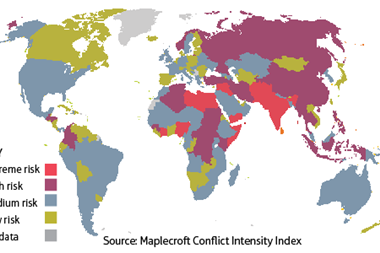Control Risks’ chief executive Richard Fenning discusses today’s major risks, ranging from the war in Libya to the rise of China, ‘hacktivism’ and Somali piracy
How do you see the situation in Libya and the Middle East evolving?
Libya is essentially being run as one man’s fiefdom. [Colonel Muammar] Gaddafi has stopped any other institution gaining power that could rival his. Most of the rest of the Middle East is not like that. So Libya, unlike Morocco, Algeria, Egypt or Tunisia, is capable of becoming a failed state, in the sense that the basic functions of the state are not able to deliver what the population needs.
It would be wrong to see Libya as a blueprint for what might happen elsewhere, because it does have this rather odd characteristic. So the intensity of what we are seeing and the possibility for dire consequences is greater.
Having said that, there could be some significant opportunities as well depending on how the Middle East re-emerges from this. There could be investment opportunities. You may well see as a consequence of this that a much more engaged pluralist society emerges, where creative entrepreneurial talent is unleashed.
The World Economic Forum warned of the breakdown in global governance. And we saw this at the Copenhagen Climate Summit where world leaders failed to reach agreement on curbing greenhouse gases. There is also a tendency for countries to look out for themselves during a downturn. And a pressure on them to introduce protectionist measures to bolster their own homegrown industries. What can be done about this?
Yes, there’s always that. If you look at what’s happened over the past 10 years, though, the whole move towards globalisation has continued despite the rhetoric of politicians. So in the USA there’s a huge angry commentary about the loss of US jobs to other parts of the world, but actually nobody ever does anything about it. It is just the way the world is going. You get a lot of noise about it but actually I’m not sure whether that process is going into reverse in any meaningful way.
What are your views on the rise of China? Can it be compared to the rise of Germany in the 20th century? Obviously there were dire consequences for the world back then. How is the world going to cope with the emergence of China as a superpower?
In theory it’s to everyone’s huge advantage. Not least because China has underwritten the US deficit for the last few years. The implication of your question is: are we heading for some major clash between China and the West?
America has the largest defence budget in the world by some way. The reason it is able to afford a large army is because China underwrites its budget deficit by buying US treasury bonds. Therefore, China is effectively funding US military spending.
So if it is all going to end in war then it will, rather bizarrely, be a war that China has paid for.
But I don’t think that’s going to happen. The Chinese are way too clever for that. They want to avoid confrontation with the USA. The theory is they are so interlinked they can’t survive without each other. And to a certain extent that is true. Mutual trade dependency will overcome political differences. It is easier to threaten people if you don’t have billions of dollars invested in their well-being.
What’s the right strategy to cope with the rise of cyber risks? We’ve seen with WikiLeaks how ‘hacktivists’ can launch revenge attacks against companies.
It’s really difficult because you’ve got hacktivists and then you have state-sponsored espionage where people will break in to steal information or do damage. This is a very potent threat at that state-to-state level. It is extremely hard to protect against absolutely. It’s beholden on all companies to have the best possible information protection measures that they can and for people to assume we are living in a hostile environment.
I wonder if there’ll be backlash against hacktivism, and whether it will be regarded more as a criminal activity rather than the Robin Hood mystique that has grown up around it.
Piracy is another big issue in the headlines, in particular the rise of Somalia pirates, but elewhere too. How has it been allowed to become such a problem?
It’s kind of a medieval risk that has come back to haunt us. Fundamentally it hasn’t changed at all – it is still young men climbing up the side of your ship at night and taking it over.
As piracy gets more violent and more outrageous then the response to it will get more assertive. It could take the form of attacks on pirate havens in Somalia or more aggressive responses from international maritime forces.



















